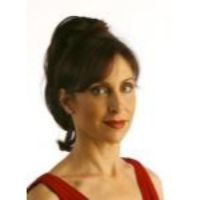
In pursuit of her stories, Faye Flam has weathered storms in Greenland, gotten frost nip at the South Pole, and floated weightless aboard NASA's zero-g plane. She has a degree in geophysics from the California Institute of Technology and a certificate in science communication from UC Santa Cruz. She interned at The Economist before taking on the physics and cosmology beat at Science. A longing to write for the general public brought her to The Philadelphia Inquirer, where she started two weekly science columns, Carnal Knowledge and later, Planet-of-the-Apes. She currently writes a science blog called Lightning Rod for the NewsWorks website, associated with the public radio station WHYY.
She has won several fellowships and awards, including first prize in the Keystones for a piece on a wrongful murder conviction. In addition to writing for NewsWorks, she critiques her science writing colleagues for the Knight Science Journalism Tracker.

I can't recommend the journalist-in-residence program highly enough to writers who want to get beneath the surface and understand the process of scientific inquiry. During my seven week stay there were three concurrent programs. I focused most of my attention on the one dealing with the evolution of cooperation and multicellularity. That proved to be a fascinating window into the way scientists approach an unsolved mystery: How and why did single-celled organisms start working together to become complex organisms like us?
I witnessed the way people brought different points of view to the table - as theorists and experimentalists studying everything from social amoebas to seaweed learned from each other. The interdisciplinary nature of the program illustrated ways that physicists and biologists approached the same mystery from different angles. I'm sure my experience at KITP will inform my writing for years to come. And I left with a number of great contacts.
The afternoon coffees and wine and cheese gatherings helped me get to know the staff scientists and some of the researchers from the other two concurrent programs - polar molecules and quantum control. I had some very stimulating discussions with a number of the physicists attending those programs.
The fellowship came during a time of major transition for me. After working as a staff writer for various publications for more than 20 years, I have just set out on my own as a freelance writer. I am considering a new science column that would appeal to a very broad segment of the public.
Interacting with the KITP scientists helped me think of some creative ways to bridge the gap and get scientists to speak more directly to questions that excite public curiosity.
I enjoyed giving my three talks and was pleased with the many thought-provoking questions I got from the audience. The first was titled Life on Mars to Neanderthal Clones: Why weird things get attention in the popular media. It was an insider's view of the workings of a newspaper and an explanation for why they cover the stories they do the way they do. The second was called How to Sell Your Science Without Selling Your Soul, and offered some points on how other scientists got good publicity for their projects - with varying degrees of honesty. Both talks generated a lively discussion.
The best of the three talks was the final one - called Salacious Science: What I Learned from Writing an Infamous Sex Column. The column in question was about sex, but dealt with real science - biology, psychology and anthropology. Writing that column taught me a great deal about identifying questions that interest the public and addressing them with science. The talk generated an enthusiastic set of questions and much positive feedback afterwards. It was a little scary. I'd discussed this column in public before, but not for an audience that was 99% male. For a few moments I wasn't sure I would have the nerve to discuss some of the more explicit material, but I did it. People learned things, and I got some questions that gave me new ideas for stories.
Asking visiting journalists to give talks is a great idea and helped the scientists get to know me. My only regret is not giving that last talk first, as it served as a real icebreaker and I felt like I had a lot more friends afterwards. On the other hand, I might have been too nervous to pull it off as my first one. I'd like to thank KITP for having this program and letting me participate.